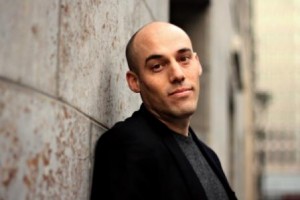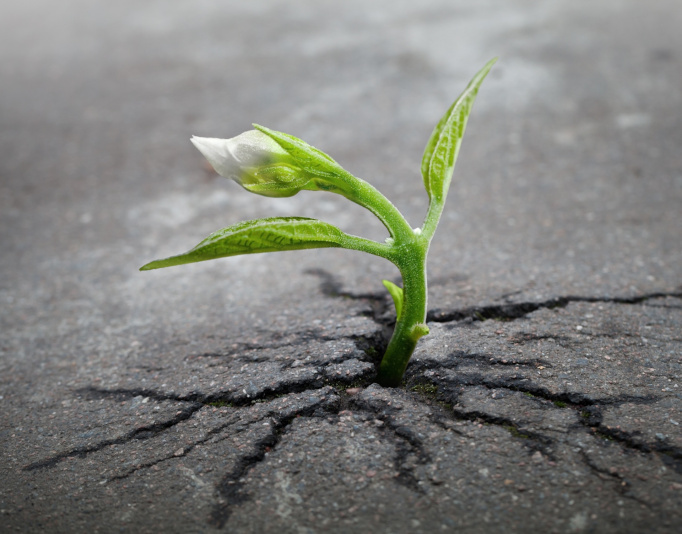Joshua Oppenheimer breaks the silence with his latest film The Act of Killing. A powerful, surreal re-enactment of the mass killings that took place in 1965 which resulted in the extermination of over 1 million Indonesians. A project which he devoted over a decade of his life living among the survivors and perpetrators.
“The film is not about the history. It is not about the past. It’s about how the past is alive in the present.” –Joshua Oppenheimer
Determined to tell the victims’ stories, Joshua found that the safest and most revealing way of exposing the Indonesia genocide was to have the killers make their own “film” by re-enacting the horrific crimes they committed.
Watch the movie trailer of “The Act of Killing”:
In this interview, Joshua shares everything he’s learned from his experience and reveals the terrible, hopeful message he hopes to get across to the audience.
Meet Joshua Oppenheimer:
Watch the interview with Joshua Oppenheimer:
Antonia: What influenced your interest in making The Act of Killing?
Joshua: I began this project in collaboration with a community of survivors who were my friends and with whom I was living in a small plantation village outside the city of Medan which is where I made The Act of Killing. I made another film there with them about their struggle to organize a plantation workers union. Their biggest obstacle in organizing a union was fear. Their parents, aunts, uncles, grandparents who had been in a strong plantation workers union until 1965, were put in concentration camps and taken out to be killed as a result of their membership in the union. The people who were struggling to organize a union in the aftermath of the Suharto dictatorship were afraid that this could happen to them if they were too militant in their organizing efforts. We tried to make a film together to document exactly why they were so afraid and the nature of a regime of impunity. I felt that here is a community with whom I was living and trusting me with their stories. They wanted to essentially show the rest of Indonesia and the world the nature of the regime of fear under which they were living. I felt that it was somehow my responsibility to make a film that would take their situation seriously. As we started filming, specifically about the 1965 killings, we would get arrested. The police would come, the military would come and they would stop us from filming and take our equipment. It was scary for all of us, but particularly terrifying for the survivors who had been living in a system of political apartheid ever since the 1965-1966 killings. At that point we discussed not doing the film. Perhaps it was too dangerous. All of the survivors said, “No, you must, we must continue!”
No one had documented what had happened in this part of Indonesia. We are talking about tens of thousands, maybe hundreds of thousands of people being killed in this one region and no one had documented it. At the same time, no one in Indonesia was really speaking about the nature of the present day regime.
It was a regime built by mass murders on the celebration and mythologizing of genocide as something heroic.
Basically, everybody said, “Josh, you must continue. You have to do this. Please, do this!”
One of the survivors with whom I was working suggested, “The safest way to do this and the most revealing way to do this will be to film with the perpetrators. They will boast and appear to be proud of what they’ve done. Film their boasting, film their apparent pride and the audience will see why we are so afraid and the nature of the regime under which we are living.” So, I felt as though I had been entrusted with a work of historical, moral and political importance. I was determined to give it everything that I could, including a decade of my life and my Indonesian crew gave it a decade of their lives too.
Antonia: How did you approach the killers and get them to participate? How did you gain their trust and confidence in taking part in the movie?
Joshua: In a way the movie is a response to the fact that I didn’t have to do almost anything to gain their trust. I simply had to treat them with kindness and as a human being.
The woman who suggested I speak to the perpetrators, suggested I start with my next door neighbor in this village where I had been filming. He was the person who she explained had killed her aunt. I went over to his house and I asked him what he did for a living, just to break the ice. Within moments he said, “Well, I used to be the security guard on the palm oil plantation here. I was promoted to be the manager of the whole plantation because I killed 200 communists on the plantation.” I said, “What do you mean you killed 200 communists?” He said, “Well, there was a union and the members were all communists. I beat them up until they were unconscious and drowned them in the irrigation ditches.” He was not wearing a shirt, so he shows me his muscles and how he is still quite strong and maybe could still do it and laughing as he tells me this. Sitting there listening, was his ten year old granddaughter as though she had heard this many times before. I was asking myself 2 things at once: What happened, what did he do? But, also, how on earth can he be talking so openly about this? He is speaking in front of his granddaughter, how does he want to be seen by her? How does he want her to remember him? How does he want me to see him? How does he want the world to see him? How ultimately does he see himself?
Starting with him, I filmed ever perpetrator I could find and they were all open in that way. I found I was asking myself questions of the imagination. How do these men imagine themselves? How do they want the world to imagine them? What stories do they tell themselves so that they could live with what they’ve done? What nightmares do they have?
All of them were not only eager to boast about what they did but, eager to show me what they did.
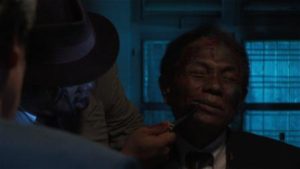
They took me to the places where they killed, to re-enact how they did it. They would complain afterwards that they hadn’t brought machetes along to use as props or friends along to play as victims. I came to understand that if I would let these men dramatize what they were already inclined to do, namely dramatize what they’ve done and film the process and combine the process of the making of their dramatizations with the dramatizations themselves, we would essentially have created a new form of documentary. A documentary that answers these questions of the imagination. That is exactly what I proposed to them. I said, “Look you have participated in one of the biggest mass killings in history. I want to understand what does it mean to your society? What does it mean to you? You want to show me what you’ve done. Go ahead and show me what you’ve done. I’ll film the process and combine all this material and thereby create a new form of documentary film.” Anwar Congo, the main character of the film, was the 41st perpetrator whom I filmed. He became the main character because he used the re-enactments to go somewhere very deep.
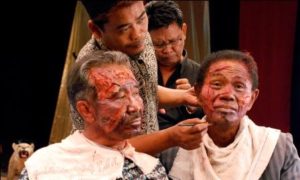
Antonia: All these men have never been punished for their crimes. Actually, they are considered as heroes. Like you said, they still hold powerful positions. From your experience, how could this be? Would you say they showed signs of remorse?
Joshua: I think those are great questions. As Adi, one of the killers in the film says, “no one has ever been punished for the American Native genocide. No one has ever been punished for segregation. In a way, no one has ever been punished for the British Empire. No one has ever been punished for the excesses of the Cultural Revolution and the regime of terror based upon which still is in place in China and allows all the computers through which we are speaking, to be made cheaply enough that we can afford them.
So, we depend on other people’s suffering for our everyday lives
because in most places, I would say, people who commit atrocities are not punished and become the powerful men in our society. Normally when we hear from perpetrators, once they are already designated as perpetrators, they either deny what they’ve done or apologize for it. But that’s because once they are designated as perpetrators, they’ve been removed from power, overthrown or at least been forced to admit that what they’ve done was wrong. Here, these men have never been overthrown and they’ve won. They are still in power, they still rule over the society. That means they still have the opportunity to justify what they’ve done. Now, if you and I had killed somebody and I hope we wouldn’t, but we are lucky enough never to know. If you and I had killed someone and we had the opportunity to justify to ourselves and to our communities what we’ve done, I’m 100% sure we would. Because it would save us the torment of living with what we’ve done and living with our conscious. Even if we know it’s wrong, we would justify it. As Adi, one of the death squad member says, “killing is one of the worst thing you can do. But if you get paid well enough or it’s in your interest to do it, do it. But then you need a good excuse.” After these men killed for power and for money, they then needed a good excuse. The government provided them a good excuse in the form of propaganda. They became quickly addicted to that propaganda. Propaganda is justification and celebrates mass killing as heroic struggle. Once they’ve justified and celebrate what they’ve done…we see them celebrating what they’ve done in the very first scene with Anwar. We see him dancing where he has killed 1000 people and it looks like he is remorseless at first because it is such a shocking moment. If you think about what I’ve just said, what we find over the course of The Act of Killing, is that
this celebration of atrocity, this justification of atrocity which seems to be a symptom of remorselessness, is in fact a very human reaction to the fact that they know it’s wrong.
It’s an attempt to justify to themselves what they’ve done. And where that paradox becomes tragic is that the celebration of atrocity then becomes a tool to keep everybody else afraid. It becomes a cover for committing further evil. So, once you have corrupted yourself by killing once, and you justify it to run away from your conscious, then it becomes possible to kill again and killing again becomes proof that it wasn’t wrong in the first place. Then you can kill again, you can torment your survivors, you can blame the victims for what happened. Maybe this is the real secret to Anwar Congo, the main character’s journey in The Act of Killing. Ironically what appears to be a symptom of remorselessness in the beginning of the film, becomes sort of the trap door into Anwar’s conscious and into the conscious of a whole regime. Which is why when the film is screened in Indonesia, people think, this is a dark mirror held up to our whole regime, to our whole society and there’s no going back, there’s no pretending that everything is okay after watching the film.
Antonia: You mentioned how they were making excuses to justify their actions. At some level, don’t you think that as human beings we all have these qualities? Maybe not to the same intensity as being killers but, the same qualities in our daily actions.
Joshua: Absolutely. We all use storytelling to escape from our most bitter and indigestible truths.
You and I, the computers we are talking to each other through are haunted by the suffering of the people who made them. It is also true of the clothes we are wearing, the furniture we are sitting on. How do we live with that? First of all, we are very distant from the suffering. When you buy an iPhone, the workers (in countries where the iPhone is manufactured) have nettings on the balconies of their dormitory so that they don’t throw themselves off in despair. People Queue up for days when the new model of the iPhone comes out in order to buy it because we have fetishized other people’s suffering.
We have taken other people’s suffering and we wrapped it in a beautiful packaging.
This is exactly what Anwar Congo does in the waterfall scene. He imagines himself in heaven and imagines his victims there to thank him for killing them and sending them to heaven. He has taken something horrible and wrapped it up as beautiful because it is easier to live with in that way.
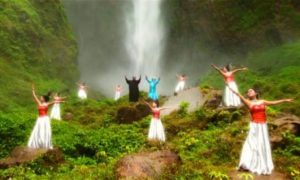
I think we all use storytelling and language and fantasy to cope with the scary, frightening parts of our reality.
Antonia: What is the biggest thing you learned from having spent so much and having been so close to them?
Joshua: Everything I have mentioned are things I have learned. But, the film making process has made me less judgmental. I learned that when we leap from saying that someone is a human being who has done evil to someone is an evil human being, we denounce an entire life, an entire person. We feel entitled to make that judgment because we assume that while we make that judgment, we are good. We cling to a fantasy that the world is divided into good guys and bad guys, what I call the Star Wars morality. That fantasy is an example of storytelling helping us escape from our most bitter and uncomfortable truths. This truth being that we are all human and that every act of evil in human history has been perpetrated by human beings just like us. I think that if we want to prevent and are serious about preventing these things from ever happening again, which unfortunately they keep happening,
We have this mantra “never again”, but it always seems to be taken to mean “never again to us”, if we really mean “never again”, we have to look at what really happens. What really happens is that human beings destroy other human beings again and again and again. It’s painful to see that. But, unless we see that it’s human beings who do it, we have no chance in preventing these things from happening. I think when viewers see themselves in Anwar for a moment, ideally for much of the film, but even for a moment, that whole Stars Wars fantasy collapses because we see he is a person like us and we identify with that horror that he must be feeling as he realizes that there are bitter truths about his reality that he will never escape because he has destroyed people.
Antonia: We separate ourselves and label these people as being a “monster”. So, you’re saying that unless we stop doing that and see them as human beings, things will never change.
Joshua: Absolutely. The moment that you say that they are bad and that the people who perpetrate atrocities are monsters, how do you prevent atrocities? Well, you have to get all the monsters, round them up, put them in prison, kill them, whatever, but you have to eliminate them somehow. That of course, is the beginning of repetition. Then you become a monster because you are hunting people down and you’re eliminating them.
We are all perpetrators. Let’s just be straight about it. We are all depended on other people’s suffering for our survival.
One story we tell ourselves to deal with that fact is economics. We tell ourselves that we need permanent, positive growth everywhere in the world forever. We don’t really think about the Malthusian consequences of that population expansion ecological disaster. That sort of technocratic discourse distances ourselves from the consequences of our actions. We need much more imaginative solutions then buying organic apples. We need collective profound solutions. I hope The Act of Killing helps people to come into contact with the experience of alienation. What I’m talking about is alienation, right? We’re alienated from the suffering of others, we purchase people’s suffering and in nicely wrapped up shining products. But we don’t really think about what that feels like. When viewers at the end of The Act of Killing feel devastated, because some do, it’s because they’re sensing the isolation, the loneliness, the fragility, the fear and the apparent helplessness that leads us to run away from actually reaching out to each other and dealing with these problems. You know, the message that the perpetrators are human is a terrible message because it makes us realize maybe we could all have this in us, maybe we do all have this in us. But it’s also a hopeful message because it implies that we could build ways of living together, ways of caring for each other, societies where we think before we harm each other, where we learn to love each other, where we learn to empathize with each other more. In fact, that is the only hope. We’re all in this together and we have to survive and care for each other together.
Antonia: From having watched the film, for me, it was not a documentary about a series of crimes that took place. It felt like there were other intentions and motives. Is what you’ve said the motive and message you were hoping to get across to the audience?
Joshua: The film is not about the history. It is not about the past. It’s about how the past is alive in the present. Particularly by holding a mirror up to Indonesian society where we see what happens when we, as human beings build our normality on terror and lies. I also hope to hold the mirror up on all of us and to lead all of us to ask,
“wait, if we are all more like perpetrators than we like to think, how can we think carefully about how we imagine ourselves and imagine our life together as human beings on this planet?”
Antonia: You hear about so many efforts that have made to prevent this kind of thing from happening. Yet, there has been so many atrocities or genocides for decades. In your opinion, do you feel like we are progressing in these efforts?
Joshua: I really don’t know. It’s beyond me. I think my task as an artist is to be hopeful enough to find it worthwhile to deliver a terrible message. To create a vision as bleak as the one in The Act of Killing, you have to have hope that it will make a difference otherwise you wouldn’t spend a decade doing it. The final shot in The Act of Killing where you see them dancing even after Anwar may or may not have realized consciously, we see him and Herman dancing at the mouth of this enormous fish, we have this sense that we are utterly lost in our fantasies.
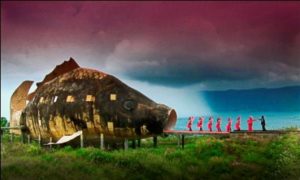
We have to be prepared to make some sacrifices together and work together to make change. I don’t know that I am an optimist, but I am optimist enough to feel that it’s worthwhile to be loudly pessimistic.
Antonia: The movie has pretty much premiered worldwide. Have you heard about the responses In Indonesia from the survivors?
Joshua: Well, if there is a cause for optimism, it’s there. The film has triggered a change about how Indonesia talks about its past. The film cannot be released commercially in Indonesia because they have political film censorship. Basically, to get around the censors, we have shown the film to Indonesia’s leading journalists, filmmakers, historians, human rights groups, survivors groups, artists, writers. They all really loved the film and we encouraged them to take the film back to their network and hold screenings. Starting last December on International Human Rights day, these groups starting holding screenings all over the country. Since then, it’s grown to probably over 300 screenings in 95 cities. The film has provoked a national conversation which is much bigger than that. The media in Indonesia, for the first time in 47 years is investigating the genocide as a genocide, reporting on it extensively and talking about what happened. There is this sense that the film has come to Indonesia like a little child in the emperor’s new clothes pointing at the king and saying, “Look, the king is naked.” Actually, everybody knew that the king was naked but, nobody had the courage to say so. Once it has been shown so forcefully and emotionally and by the perpetrators themselves, these men who should be enjoying the fruits of their victory are broken, destroyed and damaged by what they’ve done. Once that’s happened, there’s no going back, there’s no pretending that this is not the case, there’s no stuffing the ginny back in the bottle. So, there is this national discussion about what happened and about recovering what was lost. The Act of Killing isn’t just about killing human beings, it’s about killing ideas, killing communities, killing culture, killing hope and values. There’s this movement to recover what was lost and talk about what happened. Pushing the government for an official apology, pushing for truth commission, and then reconciliation. Reconciliation can only happen once there is an establishment of the truth. Hopefully, there will also be a movement against the corruption and the gangsterism, all of which have been built on the genocide. The best part of releasing The Act of Killing, is the change it’s making in Indonesia now.
Antonia: How about the perpetrators? Have you been in touch with Anwar? What was their response after the release of the movie?
Joshua: Anwar has seen the film. Anwar is very moved by the film. He was very emotional in a positive way. He said, “This film is what I thought I was making and shows what it’s like to be me. It’s an honest film and I will remain loyal to the film.” He has remained loyal to the film. He and I are touch every few weeks, friendship is not the right word but, we both have love for each other as human beings. Herman loves the film, which is not surprising because along the way he discovers acting and develops and actor’s commitment to the truth. I haven’t shown the film to the political leaders who have only cameos in the film because that would be dangerous for everyone trying to get the film out. I assume they will not like the film. I hope they will not like the film because it’s meant to expose them as emblematic of a regime of corruption. I haven’t shown the film to Adi because he is still powerful and if he would see it, those political leaders would see it and I feel it is unsafe to show him the film. But, he won’t be surprised because he didn’t come in the film trying to glorify himself. He comes in saying, “what we did was wrong, the government should apologize.” He leaves the film saying, “this film is going to make us look bad.” So, he knows exactly what the film is going to do and we are in fact not on good terms. He did make only one comment when the film came out which is, “this film is now screening all around the world, why am I not getting rich from this.”
Antonia: Is there another project in the way?
Joshua: Yeah. So, as I said, when I started filming with the survivors, it was dangerous. When I started filming with the killers it was like the regime rolled out this red carpet for our process. Once I was working with the perpetrators, I was in the shadow of these very powerful men and I was beyond suspicion. So, I was able to continue shooting with survivals provided that the perpetrators didn’t know what I was doing. I would tell them I was going to film a friend for an irrigation project, something that was sufficiently boring where Anwar and his friends would not want to come. So, in filming with this family of survivors, they find out through my work who killed their son. The youngest brother decides how is he supposed to raise his children living alongside perpetrators who are boastful about their crimes. He decides to meet everybody who is still alive and involved in his brother’s death. He becomes this one man “truth and reconciliation” process in a country where there will never be truth and reconciliation or at least it seemed highly unlikely before The Act of Killing. So, that’s the other film. It should be along in about a year.
Antonia: Thank you so much, Joshua. If I may say, you are a role model and inspiration in showing how one person can make a difference.
Joshua: Thank you very much. I just will say one thing. We should thank the incredibly brave, hard working Indonesian crew. Especially my co-director without whom this would be really impossible.
If Joshua’s message has made you gain a deeper human understanding? Please share his story.

